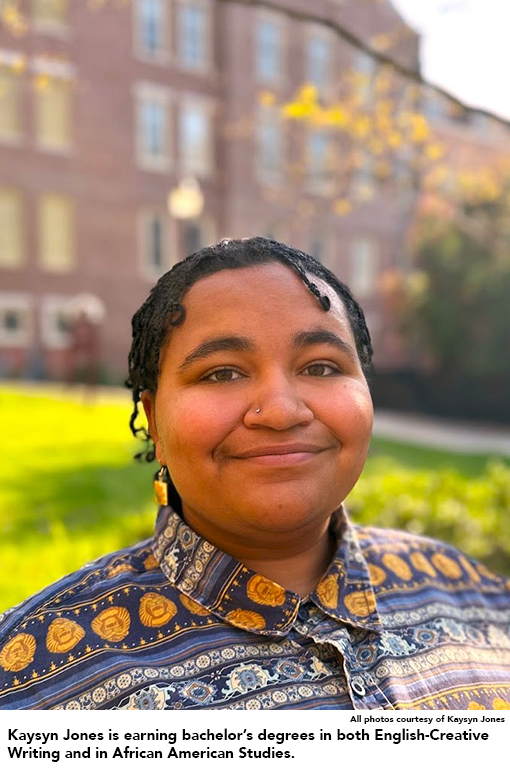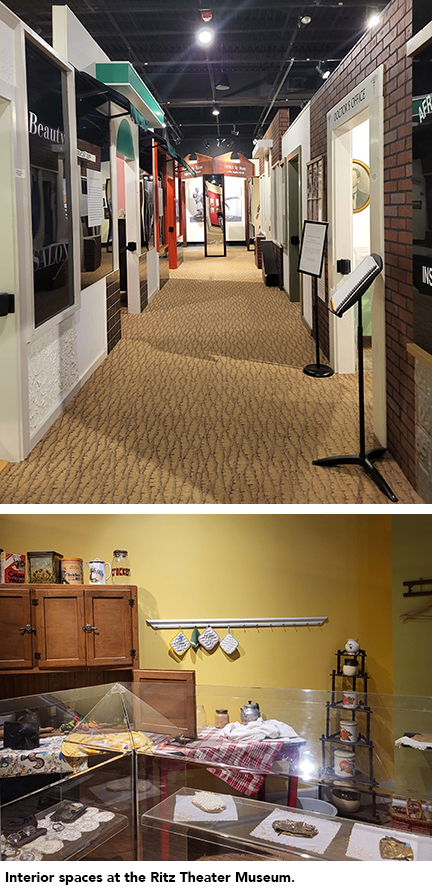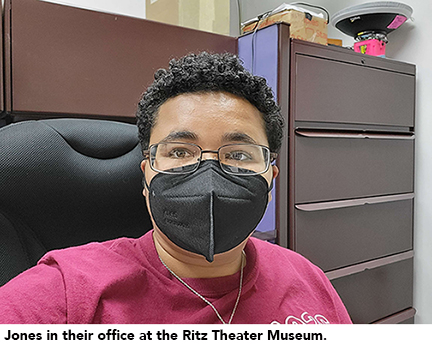English-Creative Writing major and Global Scholar Kaysyn Jones spent summer 2023 researching Black history in Jacksonville
By Miranda Daubar
Kaysyn Jones is a first-generation student at Florida State University, but they already know that academia is in their future. That career goal stems from Jones’ parents encouraging their further education and lifelong learning.
“My parents both love to learn, and my mom made me love reading in the first place,” Jones says. “My dad always questioned me and pushed me to find out new things.”
The impact Jones’ family has had on them to follow their dreams is shaping Jones’ experiences at FSU, where they are earning bachelor’s degrees in both English-Creative Writing and in African American Studies. Jones has watched family members struggle, so they work hard as a student to ensure they will not have the same worries.
Jones wishes to one day become a college professor. Even with the dedicated work necessary to achieve that goal, Jones is optimistic about their wish to work in academia.
“I have gone back and forth on this, especially as a first-generation student,” Jones says. “The pressure to succeed is self-imposed, but my parents have worked very hard and I want to be the person who can help take of the family later on.”
While Jones looks forward to their future, they are also proud of their past accomplishments and how being involved in their community has taught them so much about history, specifically Black history in Jacksonville, Florida.
Their two majors factor heavily in Jones’ work with FSU’s Global Scholars Program, specifically for their research in evaluating how Black artistic spaces manifest in American society. Jones spent two months during the summer of 2023 at Jacksonville’s Ritz Theater and Museum, learning about and being involved the museum’s offerings for those wanting to know about the city’s forgotten history.
“I can say that my experience with the museum showed me how meaningful spaces like that could be, but also the lost potential of a lot of those spaces,” says Jones, whose research was focused on Black art, how it was curated, and its impact on the community. “Museums like the Ritz have no negative downsides for the community: they help revitalize it, they draw interest, they draw and recycle money through the community, and most crucially, they serve as a place of meeting, understanding, and connecting for people.”
Jones' role at the museum was to record and catalog objects stored on-site from the Abel Bartley Collection. Jones wrote a synopsis for each object so people looking for the artifact could find it easily in an online search.
Bartley earned multiple diplomas from FSU in a span from 1983 to 1994: two Bachelor of Arts degrees in history and in political science; a Master of Arts degree in history; and a doctorate in African American and Urban History. He currently is a professor of history at Clemson University.
Bartley’s home was Jacksonville and he studied the history of desegregation in the Jacksonville education system.
“It was intellectually stimulating and rewarding work and it was fun for me to do and go through,” Jones says. “Bartley was working through the 1980s and 1990s and it was exciting to see what he was working with because he was naturally drawing from sources that I was interested in.”
Jones says that Bartley is an accomplished and brilliant academic, but he sometimes had a disorganized approach to his research. He would photocopy entire books but not write the title down, so Jones had to search certain texts to find the title for the records.
Jones met a few of Bartley’s colleagues at FSU’s 2023 Ethnohistory Conference, who said Bartley is “still a mess.” Jones jokingly says that they felt validated when finding out Bartley is still the same after all these years.
Still, after seeing the works that Bartley did document, Jones appreciates the importance of Bartley’s role, adding that without him those artifacts might not be in print today.
 Working with Bartley’s collection was not Jones’ only role with the museum. They also were trained to give tours to groups that came to the site.
Working with Bartley’s collection was not Jones’ only role with the museum. They also were trained to give tours to groups that came to the site.
“I would basically give histories on each step of the tour,” they say. “I got to do a lot of independent research and I actually ended up developing a formal tour script. It was very fun.”
Jones' work with Black artistic spaces has now become their Honors in the Major thesis, which they will begin in the fall of 2024.
“My specific intention is to show that these are spaces that matter and that they are something worth being invested into this day,” Jones says. “That’s what I want to do. I want to show that Black art is something that is significant and deserves to have a distinct place in education and also in daily life.”
Part of Jones’ thesis argument will be centered on how spaces such as the Ritz Theater Museum, like many others, are underfunded by the institutions meant to fund and support them.
“I personally think it’s because there is an institutional assumption that the only people going to those spaces are Black people,” Jones says, “or they assume that Black people are not the people who want to go there in the first place.”
So, Jones argues, funding organizations often see the Ritz and similar museums as “being less important than other spaces.”
“That is actively untrue,” Jones stresses. “We had very diverse groups of people come through the Ritz.”
An example of the underfunding, Jones points out, is that the Ritz Theater Museum’s dedicated staff includes just one archivist for the entire archive.
“That’s insane—he doesn’t have any assistants, and I was a volunteer intern,” Jones says. “That is only help that they get.” Jacksonville’s LaVilla neighborhood was once a thriving Black community, filled with successful businesses, lively libraries, educational institutions, and vibrant arts and public spaces. The area’s rich history was comparable to Harlem in New York City, Jones explains, but construction of the Jacksonville Expressway, completed in the late1960s, erased the neighborhood.
“The history makes people uncomfortable, so people don’t want to discuss it,” they add. “Jacksonville had one of the most prominent art communities besides Harlem from the turn of the century until the 1950s.”
That history may make people uncomfortable, Jones says, but learning about it anyway is important, or else the history will be lost.
“That’s what a lot of research that I’m doing now looks at,,how there are these fascinating and detailed histories that go under-investigated and underinvested in,” they say,
Similar to the impact Jones’ parents have made in their life, English Associate Professor Alisha Gaines and her course Literature of the Afro Gulf South did the same. Jones calls the class their favorite one at FSU so far.
“The coursework was just brilliant and engaging, and we got to connect to multiple kinds of writing, which is something I found especially significant,” Jones says. “We didn’t just look at books; we also looked at lyricism in historical black songs and at critical essays written when there were dialogues on art.
“The classroom dynamism made it so special to me, and Dr. Gaines herself is such a passionate, engaging, and fun professor to work with. She is one of my favorite professors that I have worked with.”
Though Jones works with historical texts now, Jones credits their high school poetry teacher Tiffany Melanson for inspiring them to be the researcher they are today.
“She introduced me to Black poets for the first time and when you’re learning about Black poets you get into Black history, and when you get into Black history that opens the door to being able to emotionally connect to history,” Jones says. “You can see people like you, who had family like you, who lived life like you and you can connect back to them. Art was the gateway to history for me and it was that connection that set me off into being so passionate about history.”
Jones recalls with heartfelt, genuine emotion an experience at the Ritz Theater and Museum when they wanted to have that kind of impact on someone.
“I remember there was this one girl who seemed genuinely invested in the tour I was giving, and I gave her a book of historical black poetry that I had on me,” Jones says. “I handed it over to her and hopefully she could get some use out of it, which would be absolutely lovely.”
Many people and experiences in Jones’ life have helped shape them into who they are and what career they wish to seek in the future. Without question, Jones’ biggest supporters in life are their parents, they say, and Jones will continue to work toward making them proud in their academic endeavors.
Miranda Daubar graduated from FSU in May 2024 with her Bachelor of Arts in English-Creative Writing, with a minor in history.
Follow the English department on Instagram; on Facebook; and on X.
